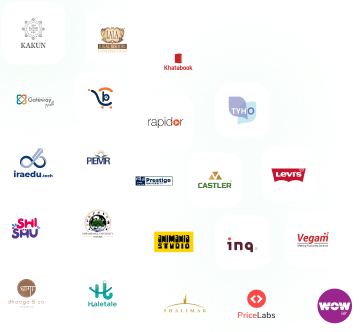
- CMS Platforms
-
 July 4, 2025
July 4, 2025 -
 Vinay Sahu
Vinay Sahu -
 Reading time: 7 minute(s)
Reading time: 7 minute(s)
WordPress vs PHP: A Comprehensive Comparison for 2025
When building a website, both WordPress vs PHP are commonly discussed terms. While they both are involved in web development, they serve different purposes. This article will help you understand the key differences, pros, and cons of each, allowing you to decide which one best suits your project.
What is WordPress?
WordPress is a free, open-source content management system (CMS) that powers over 40% of websites globally. It’s built with PHP and MySQL but comes with a user-friendly interface that allows you to manage and publish content without needing any coding knowledge. WordPress provides themes, plugins, and widgets to extend the functionality of your website.
Key Features of WordPress:
User-Friendly Interface: Simplifies website creation with pre-designed themes and plugins.
Built-In Content Management: Easily manage content like blogs, pages, and multimedia.
Themes and Plugins: Extensive library of free and premium options for customizing your site.
SEO-Friendly: WordPress has built-in SEO tools, along with third-party plugins like Yoast SEO.
Community Support: A large community that helps with troubleshooting and updates.
What is PHP?
PHP (Hypertext Preprocessor) is a general-purpose programming language primarily used for web development. It is a server-side scripting language that is often embedded in HTML to manage dynamic content on websites. Unlike WordPress, PHP requires manual coding to create a website, providing you with full control over functionality and design.
Key Features of PHP:
Full Control Over Functionality: Allows you to create dynamic websites with customized logic.
Database Integration: PHP integrates seamlessly with MySQL to interact with databases.
Flexibility: Offers complete flexibility in terms of design, structure, and functionality.
Compatibility: Works with most hosting platforms and integrates with various frameworks and libraries.
Open-Source: Free to use, just like WordPress.
WordPress vs PHP: A Comparison
1. Ease of Use - WordPress vs PHP
WordPress:
WordPress is designed for users who may not have coding experience. Its dashboard is user-friendly, making it easy to create and manage pages, posts, and media. You can customize themes and install plugins to extend functionality without writing any code.
PHP:
PHP is a programming language, which means it requires coding skills. Developers use PHP to build dynamic websites from scratch or to develop complex applications. If you're building a website with PHP, you need to write your own code for most of the functionality, which can be challenging for beginners.
Winner: WordPress (for ease of use)
2. Customization and Flexibility - WordPress vs PHP
WordPress:
While WordPress provides many pre-designed themes and plugins to simplify customization, its flexibility is somewhat limited compared to PHP. Complex customizations may require additional coding or third-party tools. However, with themes and page builders, you can create sophisticated websites without programming knowledge.
PHP:
PHP offers complete freedom over customization. Developers can write code for every aspect of a website, from layout to functionality, making it the ideal choice for those who want total control. There’s no limit to what you can create with PHP, but the trade-off is that it requires in-depth programming knowledge.
Winner: PHP (for full customization)
3. Performance - WordPress vs PHP
WordPress:
WordPress can be slower compared to PHP-built sites because of the extra resources required by plugins and themes. However, WordPress performance can be optimized using caching plugins, content delivery networks (CDNs), and better hosting solutions.
PHP:
A website built purely with PHP, particularly static sites, is typically faster because it doesn't have the overhead of plugins, themes, and other CMS features. Performance is mainly dependent on how well the code is optimized.
Winner: PHP (for performance)
4. SEO (Search Engine Optimization) - WordPress vs PHP
WordPress:
WordPress is SEO-friendly out of the box, with options for custom URL structures, categories, and tags. Additionally, plugins like Yoast SEO and Rank Math make it easy to optimize your site for search engines. You don’t need to manually code SEO elements, as WordPress handles most of the heavy lifting for you.
PHP:
With PHP, you must manually implement SEO techniques like meta tags, headers, sitemaps, and keyword optimization. While this gives you more control over SEO, it requires technical knowledge and ongoing adjustments.
Winner: WordPress (for ease of SEO management)
5. Cost - WordPress vs PHP
WordPress:
WordPress itself is free, but you will need to pay for hosting, domain registration, and any premium themes or plugins. While there are plenty of free themes and plugins, certain advanced functionalities may require premium versions.
PHP:
PHP is free to use, but you need to account for the cost of hosting, domain, and any developer resources needed to write and maintain custom code. If you hire a developer to create your website from scratch, the cost can increase significantly.
Winner: WordPress (for affordability, especially for beginners)
6. Security - WordPress vs PHP
WordPress:
WordPress is a popular target for hackers, especially if themes and plugins are outdated or poorly coded. However, WordPress has strong security features, and you can install security plugins (like Wordfence) to enhance protection. Regular updates and good hosting can also help protect your site.
PHP:
Security in PHP-based websites depends entirely on the developer’s coding practices. If PHP code is not properly written or validated, the website can be vulnerable to SQL injections, cross-site scripting (XSS), and other security threats. However, PHP itself can be highly secure if handled correctly.
Winner: PHP (for developers who follow best security practices)
7. Maintenance and Updates - WordPress vs PHP
WordPress:
WordPress updates are automatically handled, making it easier for non-technical users to keep their websites secure and up-to-date. However, if you install too many plugins or themes, updates can become cumbersome, requiring manual updates or troubleshooting.
PHP:
With PHP, maintaining a website can be more challenging. Since everything is custom-built, you need to manage updates manually. If you use PHP frameworks (like Laravel or Symfony), maintenance can be simplified, but it still requires ongoing monitoring.
Winner: WordPress (for automatic updates)
Feature Comparison Table:
| Feature | WordPress | PHP |
|---|---|---|
| Ease of Use | User-friendly, no coding needed | Requires coding knowledge |
| Customization | Limited (plugins and themes) | Unlimited (full control) |
| Performance | May be slower with plugins | Typically faster, less overhead |
| SEO | Built-in SEO features, plugins | Manual implementation, more control |
| Cost | Free software, but with hosting fees | Free software, higher development costs |
| Security | Vulnerable to plugins, requires monitoring | Depends on developer practices |
| Maintenance | Automatic updates and management | Manual updates required |
Which is Better for Your Website?
| Criteria | Best Choice |
|---|---|
| Ease of Use | WordPress |
| Customization | PHP |
| Performance | PHP |
| SEO | WordPress |
| Cost | WordPress |
| Security | PHP (with best practices) |
| Maintenance | WordPress |
Final Verdict on WordPress vs PHP :
Choose WordPress if you're looking for an easy-to-use, affordable solution for building blogs, eCommerce sites, or content-heavy websites without extensive technical knowledge. Get in touch
Choose PHP if you need complete control over your website’s functionality and design, and you have the technical expertise (or the budget to hire developers) to build and maintain a custom solution.
FAQs: WordPress vs PHP
1. Can I use PHP in WordPress?
Yes, WordPress is built using PHP, and you can write custom PHP code in your theme’s functions.php file or create custom plugins for additional functionality.
2. Is WordPress better than PHP for SEO?
WordPress makes SEO easier with built-in features and plugins. PHP gives you more control but requires manual optimization.
3. Which option is cheaper: WordPress or PHP?
WordPress is generally cheaper, as it comes with a free CMS and a wide range of free plugins. PHP development, on the other hand, may involve higher costs, especially for custom-built sites.
Both WordPress and PHP have their merits, and the right choice depends on your project's specific needs, your technical abilities, and the level of customization required.
Follow us on Facebook to know more about us.
Related Posts
- The Role of AI in Modern Website Development
- How to Optimize Your Website for Core Web Vitals and SEO
- The Role of Web Accessibility in Website Development
- Why Progressive Web Apps (PWAs) are the Future of Mobile Web
- WordPress vs Django: A Comprehensive Comparison for 2025
- How To Write An SEO Optimized
- Supercharge Your Layouts with Divi AI
- WordPress vs Squarespace
The world’s First zero commission platform
Hire tech partners effortlessly
 If you're a non-tech founder looking for an agency or a tech founder looking for engineers.
If you're a non-tech founder looking for an agency or a tech founder looking for engineers. You can get your 5 best matches from 2800 in 5 mins, with 1000 data points tracked.
You can get your 5 best matches from 2800 in 5 mins, with 1000 data points tracked. Connect directly with no credit card needed!
Connect directly with no credit card needed!
You’re just a click away from the best talent.
About the author

Vinay Sahu
Founder & CEO of Alfyi
With over 9 years of experience, Vinay Sahu has helped 100+ brands scale through impactful UI/UX design and WordPress solutions. As the CEO of Alfyi, he works closely with startups and enterprises to align digital experiences with business goals. His expertise in design systems, web development, and product strategy makes him a go-to partner for fast-growing brands building online presence with purpose and precision.
